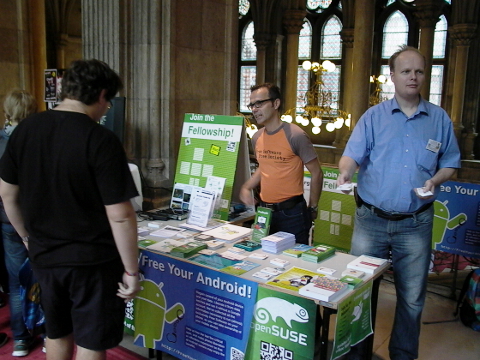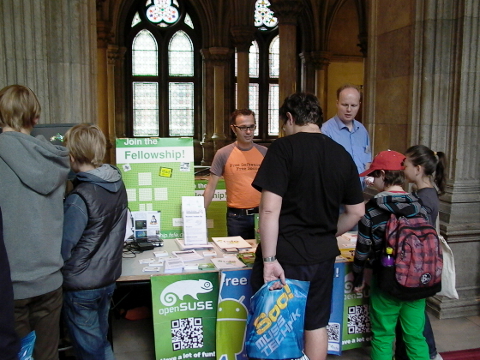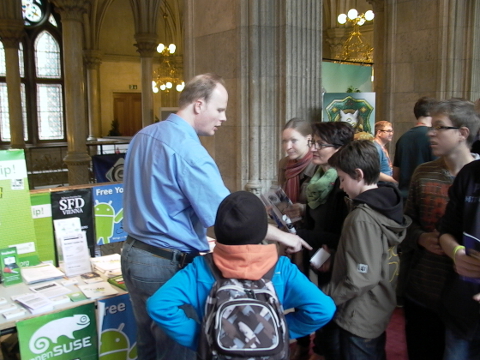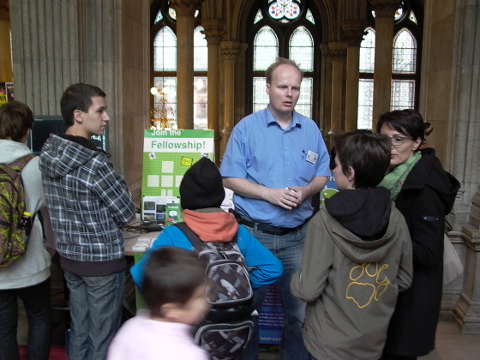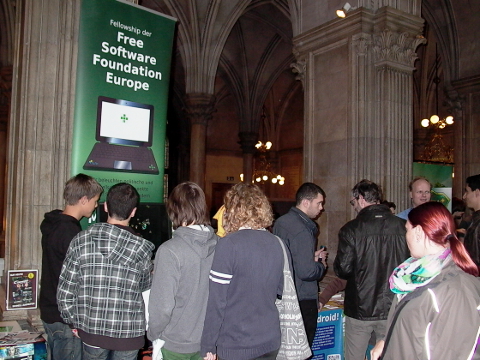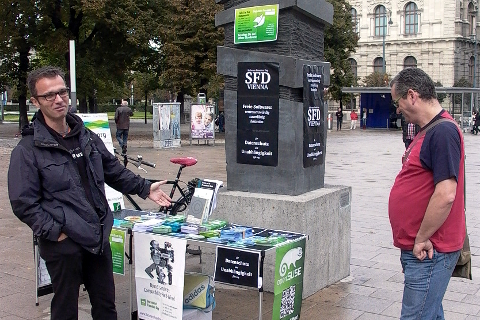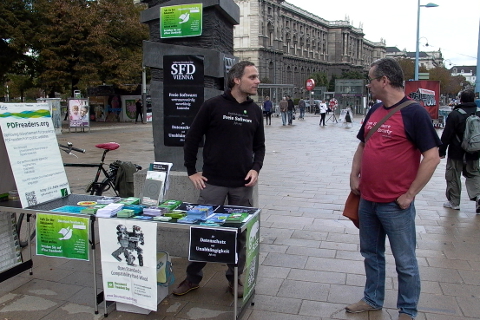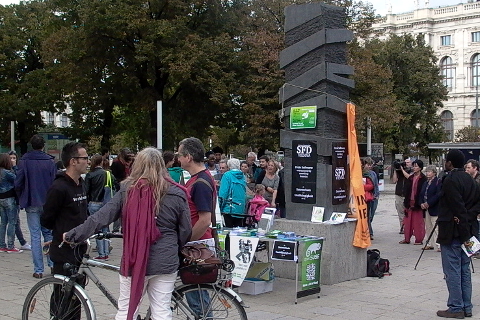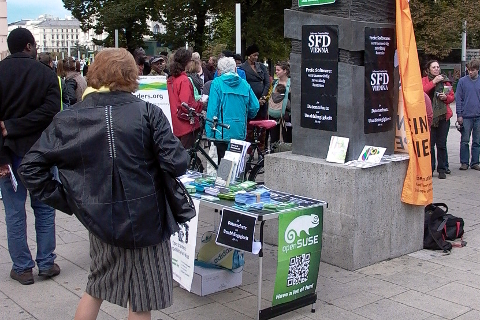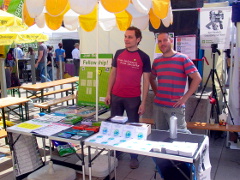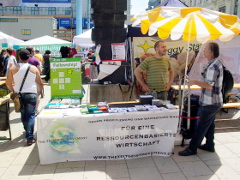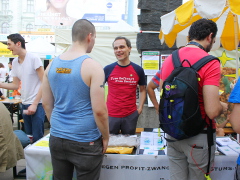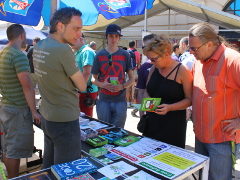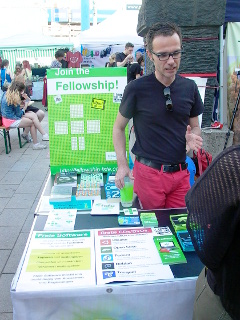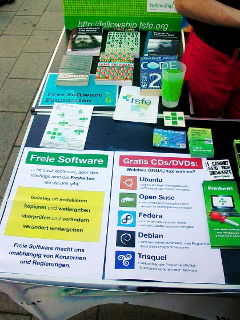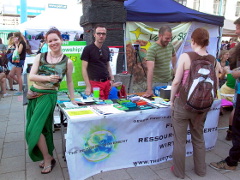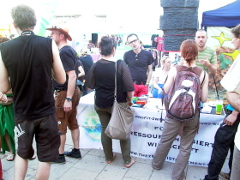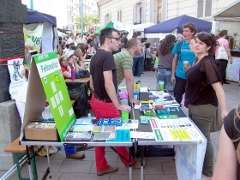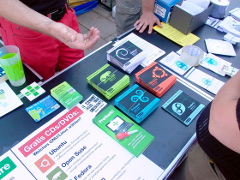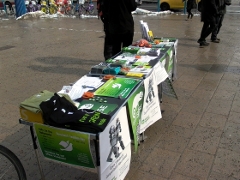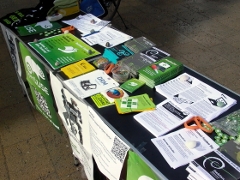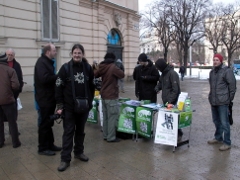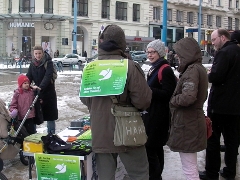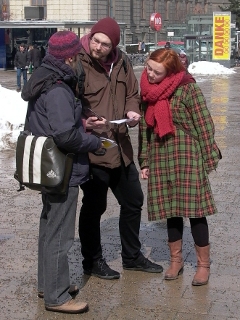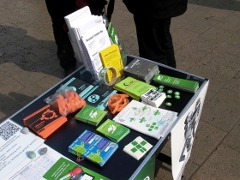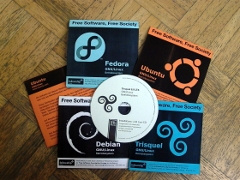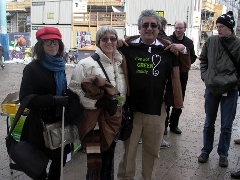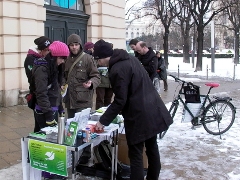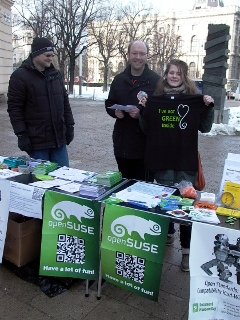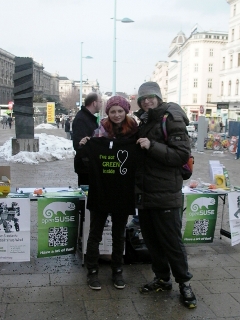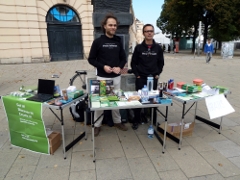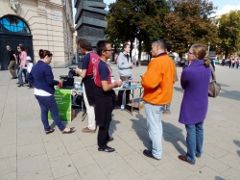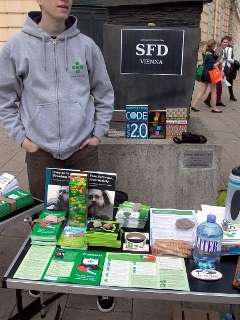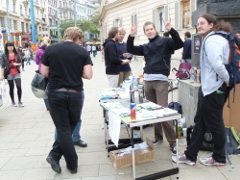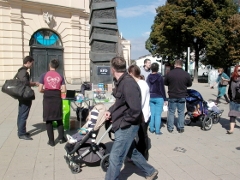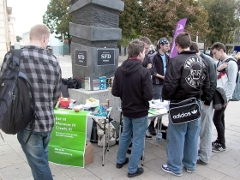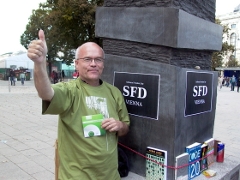FSFE supporters Vienna
Reports from the FSFE supporters group in Vienna
Darum lieber Freie Software
March 1st, 2014
Dies ist eine Replik auf Jens Starks Artikel: 7 Gründe gegen Open Source Software, vom 27. Februar 2014.
Vorwort
Ich kann gut nachvollziehen, sich einem Krieg der Ideologien entziehen zu wollen. Es ist löblich, die Stimme der praktischen Vernunft in einem ideologisch dominierten Feld sein zu wollen. Ich schätze diese Motivation. Dennoch finde ich Jens Starks Artikel schmerzhaft oberflächlich. Ich kann nicht umhin, mich zu fragen, was ihn wohl dazu bewegt haben mag, bei seinen Szenarien immer dann in der Gedankenkette aufzuhören, wenn gerade eine Idee gegen Freie Software zu sprechen scheint. Wenn er seine Gedanken weiterführen würde, hätte er ebenso gut die gegenteilige Aussage treffen können. Wieso hat er das also nicht getan? Ich weiß es nicht, aber ich möchte zumindest beschreiben, warum ich seiner Schlussfolgerung nicht zustimmen kann, dass er 7 Gründe gefunden hätte, die gegen Open Source Software sprechen.
Auch wenn manche das vielleicht als Hinweis auf eine starke ideologische Verblendung meinerseits sehen, werde ich im Folgenden Freie Software statt Open Source Software schreiben, da Jens Kritik vor allem auch deswegen zu kurz greift, weil sie die aus meiner Sicht essenzielle politische Komponente der Freie Software Bewegung übergeht. Viele Menschen, die sich auf Open Source beziehen, vernachlässigen die Bedeutung unserer Unabhängigkeit auf gesellschaftlicher Ebene völlig. Dies ist für mich Anlass, auf der Bezeichnung Freie Software zu beharren. Freie Software mag in der Praxis oft identisch mit Open Source Software sein, aber die verschiedenen Begriffe weisen auf unterschiedliche Motivationen hin.
1) Proprietäre Software ist einfacher für ungeübte Anwender?
Jede Softwareumstellung ist mühsam. Es spielt keine Rolle, ob von einer älteren auf eine neue Version oder auf eine komplett neue Software umgestiegen wird. Das hat nichts mit der Frage zu tun, welche Software einfacher ist.
Jenst Stark stellt treffend fest, dass für den Desktop-Einsatz nicht relevant ist, welche Software auf Servern läuft. (Wie einfach Netzwerke zu administrieren sind, sollte Leuten, die nur Arbeitsplätze benutzen, egal sein können.)
Ich bin zwar kein professioneller Administrator, aber ich habe immer wieder mit allen drei großen Betriebssystemen zu tun. Auch wenn es verlockend wäre, eines dieser Betriebssysteme als bedienungsfreundlicher herauszustreichen, so finde ich bisher keine überzeugende Grundlage dafür. Alle drei Systeme haben ihre Macken. Wo Windows völlig wirr und unlogisch wirkt, versteckt OSX die Komplexität schlicht. GNU/Linux ist dafür gelegentlich grafisch uneinheitlich präsentatiert, da Arbeitsabläufe oft über verschiedene, frei wählbare kleine Programme laufen, die auf anderen Systemen nur über fixe Einheitslösungen klappen.
Auf jeden Fall aber habe ich schon vielen Menschen bei Computerproblemen beigestanden und schon diverse Rechner neu eingerichtet. Meine Erfahrung ist durchwegs, dass Leute bei einem Umstieg auf irgendein anderes System ängstlich sind und sich beklagen, weil sie sich nicht immer unmittelbar zurecht finden, da manche Dinge anders funktionieren. Dabei spielt es in der Praxis keine Rolle, von welchem System auf welches andere System sie wechseln.
Zweifellos gibt es Freie Systeme, deren Qualitäten in Hinsicht auf Anpassungsfähigkeit, Ressourcenschonung oder kompromisslose Freiheit meist nur sehr Technik affine Leute schätzen können, aber meiner Erfahrung nach haben nicht so versierte Leute beispielsweise mit dem Umstieg von einer älteren Windows-Version auf eine neuere oft sogar mehr Schwierigkeiten als mit einem Umstieg auf ein komplett freies System, das eben kein Spezialklientel bedient. Häufig ist allein der Umstieg von einer älteren MS-Office Version auf eine Neuere ein Desaster für die Betroffenen.
Ich bin allgemein kein Fan von Textverarbeitungsprogrammen, die sich an Microsoft Office orientieren, aber freie Alternativen wie Libre Office sind meiner Erfahrung nach in der Regel auch in aktuellen Versionen für Umsteigende nachvollziehbarer als die massiv veränderten neuen Versionen der Microsoft Produkte.
2) Die Macht der De-Facto-Standards spricht für proprietäre Software?
Zwischen verschiedenen Programm-Versionen proprietärer Programme bestehen oft größere Kompatibilitätsprobleme als zwischen proprietären und freien Programmen.
Viele erwarten sich von proprietären Lösungen, dass zumindest alles in bester Ordnung ist, so lange sich niemand erdreistet, Alternativen zu den ursprünglich genutzten proprietären Programmen einzusetzen. Die Praxis zeigt allerdings ein anderes Bild, da die Unternehmen natürlich nicht nur einmal eine einzige Programmversion verkaufen wollen. Um sicherzustellen, dass Menschen, die ihre Produkte benützen, auch weiterhin Geld bei ihnen ausgeben, beinhalten neue Programmversionen nicht nur neue Funktionen, sondern auch die Dateiformate werden geändert. Neue Funktionen sind anscheinend für viele Menschen nicht genügend Anreiz zu neuen Ausgaben. Vor allem dann nicht, wenn auch die älteren Versionen bereits alle für sie relevanten Funktionen geboten haben.
Bei Versionskonflikten zeigt sich die Rücksichtslosigkeit proprietärer Erpressungslogik besonders deutlich: Nur wer laufend in aktualisierte Versionen investiert, darf erwarten, (vorübergehend) mit dem Rest der Welt einigermaßen zuverlässig Daten austauschen zu können. Oft ist die Änderung zwischen Programmversionen sogar so gravierend, dass ältere Dateien mit der aktuellen Software nicht mehr sinnvoll nutzbar sind. Da aber aktuelle Betriebssysteme ältere Programmversionen gar nicht mehr unterstützen, ist ein ständiges Aufrüsten unvermeidbar. (Wen interessieren schon ältere Daten?)
Auch bei Freier Software gibt es manchmal grundlegende Weiterentwicklungen, aber ältere Programmversionen funktionieren auch auf aktuellen Systemen noch sehr, sehr lange. Der konsequente Einsatz offener Standards stellt darüber hinaus sicher, dass ältere Dateien in jedem Fall noch sinnvoll interpretiert werden können.
Es gibt aber tatsächlich gelegentlich – meistens bei nicht so stark genutzten erweiterten Funktionen – Inkompatibilitäten zwischen proprietären Programmen und freien Alternativen. Diese Inkompatibilitäten aber als Argument gegen Freie Software auszulegen, ist in Anbetracht der Hintergründe ähnlich geisteskrank wie alle zu verachten, die ausgegrenzt werden, und gleichzeitig jene zu unterstützen, die versuchen, uns selbst auf diese Weise auszugrenzen.
Proprietäre Programme setzen streng geheim gehaltene Dateiformate ein. Die produzierenden Unternehmen, bemühen sich also darum niemandem zu verraten, wie ihre Dateien aufgebaut sind, damit sie Konkurrenz ausschließen können. Wenn sie nämlich zulassen würden, dass auch andere Softwareschmieden oder die Freie Software Bewegung ihre Dateiformate ungehindert unterstützen können, würden sie Konkurrenz ermöglichen. Damit könnten sie niemanden mehr zwingen, ausschließlich ihre eigene Software einzusetzen.
Genau genommen ist es also nicht so, dass die tollen proprietären Softwareschmieden großartige Produkte schaffen, die alle beliebigen Dateiformate unterstützen können, sondern es ist im Gegenteil so, dass proprietär Geschäftstreibende alles daran setzen, den freien Austausch von Daten zu verhindern. Sie können natürlich problemlos alle offenen Standards der Freien Software Bewegung unterstützen, aber sie verhindern gezielt, dass andere ihre eigenen Formate interpretieren können.
Wieso sollte irgend jemand bei Verstand ein Dateiformat bevorzugen, das ausschließlich von einer Instanz unterstützt wird, obwohl daneben offene Standards existieren, die den beliebigen Austausch der Daten zwischen unzähligen Programmen und Plattformen ermöglichen? Nur Ahnungslosigkeit kann solch eine Wahl begründen.
3) Proprietäre Software bietet besseren Support?
Selbst wer Support bezahlen möchte, bekommt ihn bei proprietärer Software oft nicht, da niemand einspringen darf, wenn es die wenigen nicht tun wollen, die das dürften. Freie Software können dagegen alle supporten, die sich die Mühe machen.
Mir ist nicht ganz klar, woher der Mythos stammt, dass proprietäre Software besseren Support bieten würde. Vermutlich gehen die meisten Menschen instinktiv davon aus, dass das Vorhandensein einer einzelnen herausgebenden Instanz die Einforderung von Ansprüchen leichter machen würde. Wer sich jemals die Mühe gemacht hat, vor der Installation auch tatsächlich aufmerksam zu lesen, was in den Vertragsbestimmungen steht, kann nicht länger daran glauben.
Darüber hinaus haben proprietäre Unternehmen in der Regel klare Geschäftsfelder. Wer die Software entwickelt, ist selten auch für Support verfügbar. Unabhängige Support-Unternehmen haben keinen Grund, proprietäre Lösungen zu bevorzugen. Genau genommen ist es auch für sie leichter, Freie Software zu supporten, da sie das ohne bindende Verschwiegenheitsverträge einfach tun können.
Die meisten Programme sind schon längst nicht mehr so trivial, dass sie einzelne Personen völlig durchschauen könnten. Ein tief reichender, umfassender Support braucht also in der Regel mehr als eine Person. Mit freien Programmen kennen sich in der Regel deutlich mehr Menschen aus, als mit jeder beliebigen proprietären Lösung, die sich ja immer nur wenige ausgewählte Leute überhaupt ansehen dürfen. Dem entsprechend ist schon rein statistisch die Wahrscheinlichkeit deutlich größer, guten Support für Freie Software bekommen zu können.
Das Hauptproblem beim Support ist allerdings nicht die Frage, ob ein Programm frei oder proprietär ist, sondern ob es es Personen bzw. Institutionen gibt, die bereit sind, die zur Fehlersuche und Behebung nötige Arbeitszeit angemessen zu entlohnen.
Falls jene, die die entsprechende proprietäre Software herausgeben, kein Interesse am Support haben, ist schlicht kein Support verfügbar. Einer der großen Vorteile Freier Software ist dagegen der Umstand, dass einmal erarbeitete Beschreibungen öffentlich verfügbar gemacht werden können und frei weiter verwendbar sind. Das ermöglicht deutlich mehr Leuten, Hilfe zu leisten, da sich auf diesem Weg unvergleichlich viel mehr Dokumentation ansammelt, als für proprietäre Software. Es ist also garantiert leichter, Support für Freie Software Projekte zu finden.
4) Ist Software als Service das Selbe wie proprietäre Software?
Egal. Das spricht weder für noch gegen Freie Software.
Wer den Service nicht selbst hostet, muss anderen ebenso blind vertrauen, wie beim Einsatz proprietärer Software. Dieses Problem hat allerdings nichts mit der Frage zu tun, ob am Server proprietäre oder Freie Software eingesetzt wird. Dem entsprechend kann ich in dieser Feststellung kein Argument für oder gegen Freie Software erkennen.
Dieser Aspekt illustriert lediglich, wie wichtig Unabhängigkeit ist und dass es nicht zur Idee Freier Software passt, blind irgendwelchen Instanzen zu vertrauen. Der Interessenskonflikt ist vorprogrammiert, wo es um eine Abwägung zwischen Profitinteressen und Datenschutzerwägungen geht. Welches Unternehmen verzichtet tatsächlich auf Umsätze, nur um die Interessen anderer zu schützen? Rational denkende Menschen erwarten so etwas unter den gegebenen Rahmenbedingungen gar nicht erst.
5) Hat proprietäre Software bessere Hardware-Unterstützung?
Das hängt von der Hardware ab. Wer sich vorab informiert und bewusst einkauft, hat keine Schwierigkeiten.
Leider werden von mancher Hardware keine Spezifikationen veröffentlicht und die zur Unterstützung nötigen Schnittstellen-Informationen ausschließlich an ausgewählte proprietäre Softwareschmieden weitergegeben. In vielen anderen Fällen hat die Freie Software Gemeinde bessere Treiber zu Wege gebracht. Freie Software ist besonders bei älterer Hardware im Vorteil, da nützliche freie Treiber auch noch verbessert werden, wo proprietäre Geschäftskonzepte die Entwicklung eingestellt haben, weil kein ausreichender Profit mehr damit gemacht werden kann. Wer beispielsweise bereits einen zufriedenstellenden Drucker hat, wird sich freuen, nicht bei jedem Update einen Neuen kaufen zu müssen, bloß weil das neue System keine Treiber mehr dafür bietet.
Die Qualität proprietärer Treiber ist nicht immer sonderlich gut. Da die verwendete Hardware den Anforderungen angepasst sein sollte, kann schlechter Hardware-Support durch eine entsprechend sorgfältige Produktwahl aber in jedem Fall in den Griff bekommen werden.
Ich erlebe in meinem Umfeld bei vielen technisch weniger versierten Menschen die Tendenz, viel zu leistungsstarke/teure Hardware zu kaufen, die sie dann oft unvorteilhaft kombinieren und schlecht warten. Dem entsprechend beruhen die häufigsten Probleme auf schlechten Kombinationen, unvorteilhaften Konfigurationen und falscher Administration. Das sind Faktoren, die für proprietäre ebenso wie für Freie Software gelten.
Die größere Auswahl an aktueller Hardware, für die ausschließlich proprietäre Treiber existieren, entschädigt uns meiner Meinung nach nicht dafür, dass wir ohne offene Spezifikationen unmöglich wissen oder feststellen können, was genau mit unseren Daten passiert. Proprietäre Produkte dürfen sogar von Behörden meist nur sehr eingeschränkt überprüft werden. Wieso sollten wir blind nicht vertrauenswürdigen Instanzen vertrauen, wenn wir auch die Wahl haben, Produkte zu wählen, die garantiert keine für uns unvorteilhaften Prozesse ausführen, weil sie einer vollständigen öffentlichen Qualitätskontrolle ausgesetzt sind?
Ein Zusatzproblem, das im Grunde nichts mit Hardware-Support zu tun hat, sich aber ähnlich auswirkt, hat Windows 8 gebracht: Microsoft verlangt von allen, die Geräte mit diesem System vorinstalliert anbieten, dass sie SecureBoot unterstützen. Theoretisch schützt diese Technologie vor der Installation nicht autorisierter Software. Weil diese an sich vernünftige Idee aber meist auf eine Art umgesetzt ist, die es den meisten Menschen praktisch unmöglich macht das vorinstallierte Windows auf diesen Rechnern durch andere Systeme zu ersetzen, wirkt das wie eine technische Sperre aller Alternativen zum vorinstallierten System. Ich kann daher nur vom Kauf eines Rechners mit vorinstalliertem Windows 8 abraten.
6) Proprietäre Software bietet bessere Garantien, Haftung und Entschädigung?
Ob Absicherungen geboten werden, hängt nur von Verträgen ab. Ob Programme proprietär oder frei sind, spielt dabei keine Rolle.
Alle, die Software herstellen, versuchen, sich so gut wie nur irgendwie möglich vor Schadenersatzforderungen und ähnlichen Ansprüchen zu schützen. Ich habe noch keine Software angetroffen, in deren Lizenzvereinbarung auch nur annähernd die Eignung zur Erfüllung des offensichtlich geplanten Zwecks der Software versprochen wird. Zusätzlich stehen wirklich erstaunlich gewagte Verzichtserklärungen in diesen Verträgen. Viele davon sind offenbar – je nach national geltendem Recht – ohnehin hinfällig, aber alles, was nicht ausdrücklich verboten ist, gilt.
Wer besondere Absicherungen haben will, muss entsprechende Verträge aushandeln. Es gibt keinen Grund, weshalb der Einsatz Freier Software solche Vereinbarungen erschweren würde. Ähnlich wie beim Support ist allerdings auch hier mit Freier Software der Pool von Personen mit ausreichender Expertise deutlich größer.
7) Sind Unternehmen beständiger, die proprietäre Software herstellen?
Wieso sollte das so sein?
Es gibt keinerlei Hinweise darauf, dass Softwareschmieden, die proprietäre Software erzeugen, zuverlässiger weiter bestehen, als Freie Software Projekte. In beiden Fällen sind kleine, unbekannte Projekte weniger durch Personen und Ressourcen abgesichert als große, bekannte. Der einzige Unterschied liegt in dem Umstand, dass Freie Software von allen aufgegriffen und weiterentwickelt werden kann, die das tun wollen. Bei proprietären Produkten besteht das Zusatzrisiko, dass sich die involvierten Instanzen auf keine für alle zufriedenstellenden Übernahmebedingungen einigen können.
Fazit
Jens Stark wollte eine Liste von Nachteilen Freier Software präsentieren. Bei näherer Betrachtung stellt sich allerdings heraus, dass er nur allgemeine Probleme unserer Informationstechnologie-Szene schildert, die auf proprietäre Software mindestens genauso zutreffen.
Nur sehr kurzfristig und oberflächlich betrachtet kann daher proprietäre Software als die bessere Wahl erscheinen. Abgesehen von der wesentlich größeren Vertrauenswürdigkeit durch die vollständige Offenlegung, ist Freie Software vor allem dort klar im Vorteil, wo langfristig zuverlässige Lösungen erwünscht sind, da sie auf offene Standards setzt, die auch dann noch zugänglich und interpretierbar sind, wenn sie sonst niemanden mehr interessieren.
Panel discussion on repression
February 15th, 2014


Today I visited a panel discussion on repression against civil political activists, mainly against refugees. From 3 to 6pm two lawers, a retired journalist and three activists spoke in the NIG building of the Viennese university about their experiences and how important public opinion/control is in political trials.
Journalists are often under pressure to present what advertising clients or media owners prefer. They are not only dependant on the funding of influential persons or institutions, but in many cases they themselves are even threatened with being put on trial if they dare to investigate or publish the truth about corruption or other abuses of power.
In Turkey there are more journalists in prison than in China or Iraq. Even lawers in Turkey face trial for nothing more than carrying out their regular work if they represent critics of the state. Refugees in Austria on the other hand, often have to cope for many years as applicants for a legal refugee status with only very basic rights and almost no opportunities. They are also under constant theat of being deported. In this situation it’s vital to stay in control of what information is reaching third parties.
The case against 13 animal rights activists in Austria serves as a very good example of how important e-mail encryption can be. In the one year trial activists had to explain the meaning and context of parts of their private online conversations dating back over nearly two decades which had been deliberately taken out of context by the prosecution. Those who didn’t use free software and e-mail encryption already, started to do so after this experience. And even after many years of painfully wasted time and expensive trial days it isn’t over: They are accused of coercing fur selling companies into pulling out of the fur trade by announcing completely legal public awareness campaigns.
As a supporter of free software I instantly assumed this audiance would be perfect for learning about the advantages concerning independency and data protection by using free software. Unfortunately I only heard about this event the evening before. Therefore I couldn’t contact the organisers beforehand and I had only limited information material available. Most of our leaflets have been spread in the past already.
Unfortunately the time schedule with so many people eager to present their perspectives was too tight. Under normal conditions I would have asked related questions in order to let people know about the special virtues of free software for political activists, but this time there was hardly any time for questions.
Our leaflets where available and on display right beside the exit door. So even if I didn’t have the chance to tell people anything, they had the chance to easily pick up what ever leaflets caught their attention.
FSFE booth on Game City Fair 2013 in Vienna
October 3rd, 2013
From Friday 27th to Sunday 29th of September the annual Game City Fair took place in the city hall of Vienna. With about 67,500 visitors, it was an even bigger event than last year. Not only hopeful startups but also the most important companies from the gaming industry showed off their newest games and technologies. In the middle of all this we had, for the second time, a small, but very vibrant booth informing people about free software, open standards and independence in the digital age.
Some activists from the local FSFE fellowship group accepted Horst Jens’ generous offer to present our cause in his expensive display area for free. Horst, from spielend-programmieren.at, teaches people how to program by helping them to develop their first own computer games with free software. Normally he starts with the language python because this is a perfect match for learning since it forces programmers to format their source code in a way that is easy to read for everyone.
Even in the direct presence of the shiny presentation booths of world leading entertainment companies, right from the start on Friday morning countless people where very interested in privacy, free software and free development of software – especially games of course. We where active from 10am to 7pm each day and hardly ever had a spare moment to relax. At times we couldn’t even direct enough attention to all the people eager to talk to us.
We experienced especially high demand for all information on the free your android-campaign. Unfortunately we already ran out of folders on that issue on Friday. At least the additional posters, flyers and tiny mobile stickers helped us through the rest of the event. Next year we should bring a lot more folders (if we manage to get a free display area again). On Friday night we made another 300 copies of our black and white folder on free software in general in order to satisfy the demand for the days ahead.
Since we unfortunately very soon exhausted all distro discs we had made so far, we also need to find a good solution to share free software in the future. We still haven’t got around to investigating the possibilities with USB sticks further.
Compared to last year at this fair we experienced a remarkable growth in interest. We also met many more people familiar with the concepts of free software and who already use Cyanogen Mod on their android devices for example. Nevertheless, a lot of people had their first encounter with the idea of free software and where happy to take a distro disc with them after we explained the basic concepts and advantages of free software. Of course, some free stuff hunters
dropped by as well, but we managed to give even some of those a glimpse of the idea of open standards and the political concepts of free software.
The steam box was an important subject on our booth. Many people shared different insights on it with us. Apparently the steam box is a specially adapted ubuntu based GNU/Linux distribution. Big gaming companies have already begun to offer their newest blockbuster games for the steam box. It looks like it will be the new console hype. Some games can be streamed from an other desktop system, but others will naturally run on the steam box. Therefore we can expect that this will be a welcome push for making graphic and sound card drivers available on free software. Even if these games are only rarely developed and distributed as free software, this new development could lead to a serious push of GNU/Linux for two reasons:
- In the past many gamers argued that they needed Windows to run the newest games. With wide support for new state of the art games on the steam box this no longer is the case.
- Instantly having drivers for the most recent graphic and sound cards could be an argument for many people to seriously consider GNU/Linux as a working alternative to totally proprietary operating systems. Even if those drivers are not free software this could widen the user base of free software considerably. It could be the first step to free software and the appreciation of free software philosophy for a lot of people.
But the great success of our booth is not limited to statistics. This weekend we might have attracted the youngest FSFE fellow so far. He wants to become a programmer and spontaneously supported our booth for two full days as someone directly inviting people to try out free software games on the system Horst set up on the booth. He was not only introducing them into the controls, but informed them about the philosophical background and was showing the 3D animation program Blender. This is how another young guy, who really knew Blender very well, came to join us for many hours and showed live how well Blender works as a professional 3D program. We hope these two stick around and become regular members of our fellowship group.
Overall we invited many people to join our monthly meetings in the Metalab and to become fellows of the FSFE. Since we met a lot of quite experienced free software users we had lots of opportunities to invite them to our support platform freie.it. We hope to have gathered enough experts for the usual support demands to get active with the platform in a few months.
The Game City Fair for sure is a remarkably good place to present free software and the FSFE. We will try to find a way to have an other booth next year again. It isn’t clear yet how this could work since Horst might not be able to host us for an other year. Maybe we can activate some contacts into the city government and get a free display area as a NPO in the public interest.
We are very thankful to Horst and all activists who supported our weekend booth marathon. It definitely was worth the effort.
Software Freedom Day 2013 in Vienna
September 22nd, 2013
On Saturday 21th September the FSFE fellowship group Vienna held an information booth in Vienna’s most prominent shopping street. Despite short rain showers occurring all day long we began at about 10:30am and finished at 7:30pm. At times we needed to protect the leaflets with our jackets, but overall we had good feedback and many interesting conversations. Up to three free software advocates ran our booth.
Surprisingly many people had heard of free software before. In most cases people quickly understood our concerns about dependence on big corporations and governments. Many wanted to take a free sample of our operating system DVDs right away. We had our own FSFE fellowship editions of Debian, openSuse, Fedora and Trisquel DVDs. Additionally we brought some of our private copies of very good books featuring free software and free culture for display.
We are considering producing USB sticks with some free software distributions to give out to people for a small donation in order to avoid one way discs and to add an additional value to the media we give out. We could possibly make a FSFE branded stick to gain additional attention through people using them.
Some people asked us for posters. We where able to give away the robots poster from last DFD, but we didn’t have the requested Fedora poster. Next time we should probably organise distro posters and t-shirts.
As we set up our stall in front of a memorial and used it to hang up our SFD-posters we had some discussions with people who felt this to be inappropriate. It was the Marcus Omofuma memorial which is dedicated to a black Nigerian man who got choked to death in 2003 during his deportation flight to Bulgaria whilst in the custody of Austrian police. The 5 meter high black stone memorial was originally illegally placed in front of the well known Vienna Opera House. The government couldn’t remove it without provoking a public outcry. Therefore one month later it was moved from the Opera to the shopping street where we set up our booth.
In our discussions we could even use this controversial point to refer to the importance of civil rights and free speech and it’s direct connection to free software. Marcus Omofuma probably would have supported free software since it is an important instrument to allow free speech in modern society. Even the memorial itself originally was placed without any permission.
An older man, living high up in a building near our stall saw our posters on the memorial and came down to visit us. He told us that he had had difficulties with installing free software on his two computers. He reported that it got stuck in an error message late in the installation process just before the desktop should start. He took some of our distro disks with him in order to have an other try.
We invited many people to our monthly fellowship meetings and encouraged them to become FSFE fellowship members.
We asked people with advanced knowledge in the field of free software if they were interested in our local project to make free software experts accessible for private free software users. We set up a new association and web page called: freie.it where we bring experts willing to support private free software users together (with or without charging for it). The web page is designed for people who value the virtues of free software, but do not have the motivation to learn more about how computer systems work at all. It is meant to give end users a means to easily find experts willing to help them with free software issues. The web page just offers the possibility to search for experts relevant to the entered search terms. Visitors get a list of these experts that they can then contact for help. The project isn’t public yet. We are still in the testing phase and want to go public when we have enough experts to give visitors satisfying results for the most frequent issues ordinary users want help with.
After packing up we celebrated the Software Freedom Day in the excellent vegetarian restaurant Harvest. Due to a newly forming fellowship group in Linz some of our colleagues went there in order to support a similar booth. Therefore we were fewer people in Vienna this year. Nevertheless, we managed to have a successful SFD in Vienna as well.
Einfach geschlechtsneutral
August 23rd, 2013
Seit vielen Jahren bekümmern mich die höchst sperrigen Lösungen
für eine geschlechtsneutrale Ausdrucksweise. Ganz egal ob es um Binnen-I, Unterstrich, Alternierende Geschlechtszuordnungen oder gar um die permanente Erwähnung beider Geschlechter geht: Nichts davon ist knapp oder einfach. Die meisten Ansätze lösen noch dazu nicht das selbe Problem beim Sprechen. Nur bei einem Geschlecht zu bleiben und dabei irgendwo zu erklären, dass damit trotzdem alle gemeint sind, ist aus meiner Sicht ebenfalls keine zufreidenstellende Lösung. (Wir können das Rad der Zeit nicht zurückdrehen und so tun, als hätten wir nie vom Baum der Erkenntnis genascht und würden das Problem gar nicht erst erkannt haben.)
Leider ist die deutsche Sprache mit völlig unnötigen Geschlechtszuordnungen geradezu gespickt.
Ich sehne mich nach einer wirklich geschlechtsneutralen Ausdrucksweise, die unsere Kommunikation nicht sperriger, sondern sogar einfacher macht.
Im Nachsinnen darüber bin ich ganz zwangsläufig auf die sächliche Form als neutrale Version gestoßen. Wenn wir statt neuen aufwändigen Konstrukten einfach für alle bisher unnötig geschlechtsspezifischen Formen ein simples Neutrum einsetzen, dann müssen wir weder die Grammatik ändern, noch zahlreiche neue Worte erfinden. Wir können dann einfach sächliche Artikel nutzen und sehr einfach wie bisher weiter machen:
Wo wir uns bisher auf Nutzer und Nutzerinnen bezogen oder einen einzelnen Nutzer bzw. eine einzelne Nutzerin ansprachen, könnten wir auch einfach von den Nutzis bzw. dem Nutzi sprechen.
Freilich klingt ein i
als Endung statt er
oder erin
vorerst ungewohnt, aber diese Form ist extrem leicht zu bilden und eindeutig weder männlich, noch weiblich. Auch die Mehrzahl mit einem angehängtem s
ist völlig regelmäßig und unkompliziert zu bilden. Da dabei ganz gewöhnlich die sächlichen Artikel verwendet werden können, brauchen wir für eine großflächige Anwendung der neuen geschlechtsneutralen Ausdrucksweise tatsächlich nicht mehr als für alle geschechtsspezifischen Begriffe ein sehr einfach gebildetes Neutrum zu verwenden. (Natürlich können manche neutrale Formen schwerer als andere gebildet werden, aber es sollte absolut kein Problem sein, hier eine allgemeine Empfehlung zu definieren.)
Beispiele:
| neutrum (Mehrzahl) | männlich (Mehrzahl) | weiblich (Mehrzahl) |
|---|---|---|
| das Richti (die Richtis) | der Richter (die Richter) | die Richterin (die Richterinnen) |
| das Baui (die Bauis) | der Bauer (die Bauern) | die Bäurin (die Bäuerinnen) |
| das Arzti (die Arztis) | der Arzt (die Ärzte) | die Ärztin (die Ärztinnen) |
| das Heiligi (die Heiligis) | der Heilige (die Heiligen) | die Heilige (die Heiligen) |
| das Chefi (die Chefis) | der Chef (die Chefs) | die Chefin (die Chefinnen) |
Ich kann nicht erwarten einen neuen Standard zu definieren, aber ich werde diese Formulierung testweise einsetzen und in der Praxis prüfen auf welche Schwierigkeiten ich damit stoße.
Ist proprietäre Software sittenwidrig?
August 22nd, 2013
Aus aktuellem Anlass habe ich mich etwas mit der Rechtslage zum Thema Sittenwidrigkeit in Österreich befasst.
Dabei ist mir im AGBG § 879 folgender Text aufgefallen:
(3) Eine in Allgemeinen Geschäftsbedingungen oder Vertragsformblättern enthaltene Vertragsbestimmung, die nicht eine der beiderseitigen Hauptleistungen festlegt, ist jedenfalls nichtig, wenn sie unter Berücksichtigung aller Umstände des Falles einen Teil gröblich benachteiligt.
Ist es eine Hauptleistung proprietärer Software, intransparent, unnachvollziehbar und nicht anpassbar zu sein? Aus meiner Sicht benachteiligen übliche Nutzungsverträge für proprietäre Software bzw. Dienste ihre Benutzis gröblich
. Es ist immerhin klar nicht im Interesse von Nutzis, ohnmächtig der Willkür anderer ausgeliefert zu sein, besonders weil digitale Datenverarbeitung mittlerweile ein unverzichtbarer Bestandteil unseres Alltages ist.
Wie kann es den guten Sitten entsprechen, uns durch Nutzungsverträge derart weitreichend einzuschränken, dass wir keine Chance mehr haben, tatsächlich jene Zwecke zu erfüllen, die uns ursprünglich dazu motivierten, überhaupt einen entsprechenden Vertrag schließen zu wollen? Wer entscheidet sich absichtlich, einen Computer oder einen Service zu nutzen, der ihm keine Privatsphäre erlaubt?
Garantiert will die überwiegende Mehrheit Computer einsetzen, über deren Aktivitäten sie selbst bestimmen kann. Wir holen uns nicht absichtlich ferngesteuerte Drohnen ins Haus, die uns zwar wechselnde fremdbestimmte Interaktionen erlauben, aber eben auch systematisch unsere persönlichen Daten Unbekannten übermitteln.
Die starken Reaktionen auf das Bekanntwerden der groß angelegten Überwachung verschiedener Institutionen (Schlagwörter: PRISM, INDECT, Snowden, …) illustrieren deutlich, wie empört die meisten Menschen über diese Vorgänge sind.
Sie könnten nicht derart empört sein, wenn sie sich wissentlich auf diese Bedingungen eingelassen hätten. Die Fernseuerung und Datenweiterleitung ist offensichtlich in den meisten Fällen keine Hauptleistung
der Nutzungsverträge, aber eindeutig zum Nachteil aller, die diese Programme und Dienste nutzen.
Gemäß AGBG § 879 [3] handelt es im Falle proprietärer Software und entsprechenden online Diensten also ganz klar um Verträge, die als nichtig
angesehen werden müssen.
Booth at Veganmania in Vienna 2013
June 12th, 2013
On 8th and 9th of June 2013 the Vienna fellowship group of the FSFE organised an information booth at the Austrian vegan society’s summer festival. This year’s festival was the 16th and, as always, welcomed visitors from all over Austria and quite a few guests from other countries too.
On the run up to the festival it looked dangerously like it wasn’t going to work out very well due to the awful weather – In the days before there was heavy rainfall causing floods all over central Europe. Fortunately, the days of the festival, and only those days, saw perfect weather: It was warm and sunny. According to official estimations – about 9000 people visited the festival.
For our booth we ordered new leaflets from the German headquarters and, as before, we prepared free software operating system discs. This time we made more than 200 pieces with five different distributions: Ubuntu 12.04 (for absolute beginners), Debian 7.0, openSUSE 12.3, Fedora 18 and Trisquel 6.0 (for experts).
Our little booth was at the centre of the festival area directly opposite the main beverage stand. At times most areas were too crowded for comfortable walking or standing. Nevertheless, our booth, even at those hectic times, provided a calm little corner, which was obviously inviting for people to stop by. We can say without doubt that our spot was one of the best.
On both days we set up our booth at about 9am and packed up at about 10pm. Starting from about midday it was hard to take a break because there were always people very interested in our subject of independence on computers and mobile phones. On no other of our quite successful booths before have we had so many engaging talks with people who had been unfamiliar with free software before, but who were instantly very interested in giving it a try.
This time we made sure that we didn’t just give away random discs to anyone willing to take something for free. We evaluated the knowledge level and explained the basic concepts of free software and even the history of why we insist on the term free
instead of open
and GNU/Linux
instead of Linux
. Our visitors listened very carefully to our explanations about why free software can’t always work on any proprietary hardware and why open file formats are the saner way to share digital data.
Like always in such situations, one of the most frequent questions was about, the nowadays unexpected fact, of how something good and reliable can be given out for free. We narrowed the wide field of possibilities down to two main ways that free software emerges: The first route is paying programmers to write something needed, but not yet existing (without the plan to sell the result afterwards). The second explanation refers to all those programmers unsatisfied with writing crippled proprietary software in their jobs, since many of them just want to prove to themselves (and others) how well their programs could work if there was no need to ensure that workflows are profitable for companies.
In numbers we handed out fewer discs than at other occasions such as DFD or SFD, but I’m sure we got a lot more about our core concerns across.
Looking back on both days, I’d like to say, that Veganmania seems to be by far the best kind of event for our booth. At Linux weeks and similar events most of the people are not very interested since they believe they know everything that they need to know about free software already. It makes more sense and reaches more people when we have a booth in a shopping street. As far as Veganmania is concerned, it seems that people there are generally open to thinking critically and therefore, more willing to try out something new in order to limit the control of corporations and governments.
We even got invited to have our booth at the large vegan summer festival in Zagreb in September.
New material
Feel free to use and adapt our information material as you please:
- cd-huelle.pdf
- DVD/CD cover (for DIN A4 sheets, extended with openSUSE)
- cd-label.pdf
- DVD/CD label (for printable disc, extended with openSUSE)
- frei-schild.pdf
- Basic free software introduction (DIN A3 poster)
- distro-schild.pdf
- Distro information sheet (DIN A3 poster)
Images
You can open images in full size by clicking on it. (Unfortunately the quality of the images is very limited due to a very old digi-cam.)
.
Document Freedom Day Vienna 2013
March 31st, 2013
On March 27th the FSFE fellowship group in Vienna organised an information booth on the corner of Mariahilfer Straße / Museumsquartier. From 10am to 7pm, a group of around 8 activists handed out leaflets and discs with various GNU/Linux distributions.
In the morning we set up our information booth in the snow. During the day however, the sun occasionally came out and managed to melt most of the snow away.
Even though temperatures where very low and most people on the street wanted to keep their time outside to a minimum, we managed to give out impressive amounts of information material and free software discs: over 1,500 leaflets and more than 450 discs with openSUSE, Debian, Ubuntu, Fedora and Trisquel live systems found interested individuals.
We did not only depend on the leaflets and discs from the official DFD promo package and the FSFE headquarter in Germany, but also added several leaflets and discs, that our own team had put together. This way, even people who only received a distro disk, also got additional information with it, since we had written basic facts about the virtues of free software and the FSFE on our self made packaging. We also organised badges as a give-away in order to promote free standards even further. Of course, these materials (linked at the bottom of this page) are all free to use and adapt.
An important addition to our resources was the generous parcel containing, amongst other items, 300 DVDs from openSUSE. The green openSUSE posters where eye-catchers and their t-shirts made visitors very happy. Thanks to the Mozilla project we could offer e. g. much loved attractive Firefox stickers and I support the Open Web
bracelets.
The company Wiener Linien provides public transport in Vienna. Since the Government has a freedom of information act and since Wiener Linien is publicly funded we collected signatures to demand public access to all service information. Only a few days later Wiener Linien announced that they would make all data accessible by summer of this year.
We decided to celebrate the DFD by running a booth in the busy shopping area because we didn’t only want to reach people already informed about the issue. With most activities it is hard to reach people outside the free software community, therefore a booth in a busy shopping street is a good way to communicate with a wider audience. We had lots of opportunities to talk to people who had little or no prior knowledge of open standards and free software.
Surprisingly, many women in their twenties were very interested and wanted to know more. This contradicts the common perception that only men care about technology and its consequences.
Needless to say, some old hands dropped by as well. We even encountered a tourist who told us that he had been using Unix for a long time and that his company was one of the founders of the OSI. He mentioned that despite being retired, he still has fun tinkering with free software and he took a live disc of a distribution that he was not familiar with.
Our thanks go out to all those who helped make this very successful event possible.
We are looking forward to software freedom day in September.
Material
Feel free to use and adapt our information material as you please:
- dfd-info-de.pdf
- leaflet explaining some basics about open standards
- dvd-flyer.pdf
- free file formats and the opensource-DVD
- dfd-button.pdf
- small batches to promote open standards (English)
- fellowship-leaflet.de_AT.pdf
- free software introduction folder
- free-software-intro2.pdf
- free software introduction folder (black and white)
- cd-huelle.pdf
- DVD/CD cover (for DIN A4 sheets)
- bastelanleitung.pdf
- DVD/CD cover cutting/folding instruction
- cd-label.pdf
- DVD/CD label (for printable discs)
Images
You can open images in full size by clicking on it. (Unfortunately the quality of the images is very limited due to a very old digi-cam.)
.
Software Freedom Day 2012 in Vienna
September 17th, 2012
On Saturday 15th September the FSFE fellowship group Vienna held an information booth in Vienna’s most prominent shopping street. We began at about 10am and finished at 6pm. Although we had planned to stay until 7pm, we couldn’t because we had given out all our materials. In the end we even used the leaflets we glued to the table at the beginning of the day because people still wanted more. We distributed over 300 Live-CDs with free operating systems and about 1000 leaflets.
Most people had never heard of free software before, but were easily convinced of the virtues of free software mainly concerning independence from big corporations and governments. Many wanted to take a free sample of our operating system CDs right away. We had official openSuse, and our own FSFE fellowship edition of Ubuntu, Debian and Trisquel CDs. We did our best to match the knowledge that people had to the appropriate software for them because it is clear that less advanced computer users might have difficulties dealing with missing proprietary drivers when using Trisquel for example.
Because we didn’t have any equipment for an open air booth before, we organised inexpensive tables, pieces of wood, some screws and hinges from a nearby DIY market and built our own poster panel. Most of us don’t own cars and we store all material in our private flats. Therefore, we tried to keep the equipment small, light and durable – especially for carrying all of it by subway and/or bicycle.
In order to clarify what we stand for, we accepted an offer from a young local free software enthusiast, who owns a small textil printing shop: For a very low price he printed our slogan: Independent through free software – fsfe.org
on black organic fair trade hoodies.
On SFD in Vienna we sometimes had dark clouds and for very short periods even light showers, but over all the weather was quite pleasant and we (and our material) didn’t get really wet. We brought a pile of our private copies of very good books featuring free software and free culture for display, but didn’t get into any discussions about it. In the end we didn’t even use our notebook computers that we had taken with us in order to show how our offered software looks and works because passers by didn’t need this kind of detail.
After disassembling our booth most of us celebrated the Software Freedom Day in an excellent nearby vegetarian restaurant. Thanks to the generous support of many local fellows and other friends involved in preparing and carrying out this event we can honestly say it was a great success.
.
Workshop für Freie Software auf der Konferenz der Initiative Zivilgesellschaft
October 24th, 2011
Am 23. Oktober 2011 hielt ich auf der 9. Konferenz der Initiative Zivilgesellschaft in der Modul Universität am Kahlenberg (Wien) einen Workshop mit dem Titel: “Unabhängig am Computer: Freie Software ist nötig” (1) ab. Auf dieser Konferenz treffen sich zweimal jährlich Personen unterschiedlichster zivilgesellschaftlicher Initiativen um sich gegenseitig über ihre Visionen und Arbeit zu informieren und um zu netzwerken.
Besprochen wurde neben Fragen zu sozialen Netzwerken hauptsächlich warum und wie Freie Software unabhängig von Konzernen und Regierungen macht. Welche Freien Programme bekannte proprietäre Programme ersetzen können, war selbstverständlich ebenfalls ein wichtiges Thema. Auch Fragen des Datenschutzes und der Comutersicherheit wurden behandelt. Alle Personen, die den Workshop besuchten, erhielten das neue von mir als Fellosship-Folder vorbereitete Handout (2) (natürlich wegen dem noch nicht anerkannten Status ohne Fellowship-Impressum) und eine Ubuntu-Live-CD als Starthilfe um sich einen ersten Eindruck über Freie Software zu verschaffen. Ich erklärte dazu, dass die Ubuntu-CD nicht ausschließlich Freie Software enthält und dass die Workshop-Teilnehmenden über die Links auf der Rückseite des Folders an komplett freie Betriebssysteme kommen können.
Obwohl die meisten Personen, die an dieser Konferenz teilnehmen, näher am Pensionsalter als an ihrer Jugend stehen, war der Workshop erstaunlich gut besucht. Viele hatten schon praktische Erfahrungen mit Open Office gesammelt. Es herrschte reges Interesse an Alternativen zu proptietären Programmen und an Lösungsmöglichkeiten für Probleme mit proprietären Dateiformaten. Die anwesenden hätten gerne Kontaktdaten von Menschen erhalten, die ihnen bei Computerproblemen helfen können. Da auch die Idee eingebracht wurde häufigere Konferenzen über das Internet abzuhalten und Skype als schlechte technische Lösung erkannt wurde, bot ich den Anwesenden an geeignete Freie Software zu suchen und bei der möglichen späteren Einrichtung zu helfen.
Der nächste Workshop dieser Art wird zwischen 8. und 11. Dezember 2011 mit dem Titel: “NGO’s brauchen Freie Software” am Tierrechtskongress (3) im Don Bosco Haus in Wien 13 stattfinden. Wenn möglich wird das Team der Wiener Fellowship-Gruppe dort auch einen Infostand organisieren.
